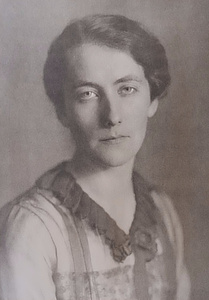Ida Kapp (1884-1979)

Ida Kapp was the first female editor at the Thesaurus. She studied at the University of Berlin and in 1915 was the first female doctoral student to complete her doctorate under Ulrich von Wilamowitz-Moellendorf (1848-1931) with a thesis on the Hekale of Kallimachos. In 1916 she went to the Thesaurus in Munich and worked there until well into the 1960s.
Ida Kapp was appointed the first female editor of the Thesaurus in 1930, a truly exceptional phenomenon, as (German) classical philology, whether at universities or in research institutions, was predominantly male. Together with the Swiss Gustav Meyer (1897-1966), who like her became an editor in 1930, she was responsible for volume V,2, i.e. for the letter E. With this volume, the Thesaurus achieved a new scientific quality, and the careful and cooperative supervision of the staff and the high scientific standards of her work as editor in charge are repeatedly emphasised in research.
Gustav Meyer had to return to Switzerland at the beginning of the war in 1939. The work of the Thesaurus was difficult during the war years, and from October 1942 the Thesaurus' holdings were moved to the Scheyern monastery. During this time, Ida Kapp ensured the continuity of the lexicographical work and also the social cohesion of the department through her regular convivia in her Munich flat.

After the end of the Second World War, the commitment of Manu Leumann (1889-1977), who by then had a professorship in Zurich, was very important in saving the Thesaurus. For the post of general editor Leumann favoured Heinz Haffter (1905-1998), who had already worked on the Thesaurus before the war. For Ida Kapp, this also meant a methodological change. It is said that in the Thesaurus of the 1950s, the supporters of her semantic-stylistic approach to lexicographical work and those of a more linguistic-syntactic perspective, following the approach of J. B. Hofmann, were almost irreconcilably opposed to each other. In any case, Ida Kapp received a commemorative publication for her 70th birthday in 1954, edited by Otto Hiltbrunner (1913-2017) and Hildegard Kornhardt (1910-1959) (Thesaurismata. Festschrift for Ida Kapp. For her 70th birthday, Munich: Beck 1959). Heinz Haffter, on the other hand, did not mention her at all in his memoirs of important Thesaurus contributors (Heinz Haffter, Et in Arcadia ego. Essays, Feuilletons, Gedenkworte, Baden im Aargau: Schweizer 1981; 160-176).
We have chosen Ida Kapp as a namesake because we want to commemorate one of the few women in the early phases of the Thesaurus. Perhaps it is also time for a scholarly examination of the different approaches to lexicon work. The articles she wrote, documentum, dominatio, dominus, domina, floreo, flos, forma or gemma and the entries ecce, ecclesia, edo, eloquentia, excelsus and exemplum, which she supervised together with Gustav Meyer, are a good approach to this.
